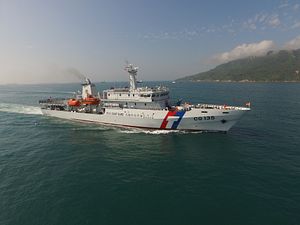On Saturday, Taiwan’s Coast Guard announced that it had detained a group of Chinese fishermen caught “trespassing” in Taiwanese waters near the Penghu archipelago, off southeastern Taiwan in the Taiwan Strait. Two of the fishermen were injured in the process.
According to Taiwan’s Central New Agency (CNA), “The boat from Guangdong province’s Nan’ao county was detected 23 nautical miles west of Penghu’s western-most Huayu islet at around 5:20 am Saturday and refused to stop for inspection despite several warning broadcasts.” The Coast Guard fired rubber bullets at the boat to force it to stop, hitting two of the fishermen in the legs.
The Coast Guard gained control of the fishing boat and brought the crew back to Penghu for questioning. The two injured men were in stable condition after treatment at a local hospital, the Coast Guard said. A statement from Beijing confirmed that the other five fishermen on board had been arrested.
An Fengshan, a spokesperson for the Taiwan Affairs Office in Beijing, said in a separate statement that “Taiwan should respect the rights of mainland fishermen and stop seizing fishing boats for no sound reasons.” He emphasized that fishermen from both the mainland and Taiwan had long used the area in question as fishing grounds, and urged Taiwan to “respect” that fact. An called for Taiwan to “seriously handle the case, release the fishermen as soon as possible and prevent the reoccurrence of similar incidents in the future.”
For its part, the Mainland Affairs Council (the Taiwanese body that handles cross-strait relations), complained that “mainland fishing boats have violated Taiwan’s law and repeatedly engaged in illegal fishing, seriously affecting Taiwanese fishermen’s rights and interests.”
The recent spat comes at a time of increased cross-strait tensions, with Beijing refusing to engage with the Tsai administration in Taipei unless President Tsai Ing-wen acknowledges the “1992 consensus.” The unwritten consensus that there is only one China (with both sides of the strait free to interpret “one China” as they wish) underpinned cross-strait ties under Tsai’s predecessor, Ma Ying-jeou. Beijing made an endorsement of the 1992 consensus a precondition for continuing official cross-strait relations, and was not satisfied by Tsai’s more general pledge to uphold the “status quo” in cross-strait ties.
However, clashes over fishing rights predate Tsai’s inauguration, which took place on May 20 of last year. In fact, recent encounters between Chinese fishing vessels and Taiwan’s Coast Guard are down markedly from a high of 9,199 in 2010, the second full year of Ma’s supposedly pro-China administration. Last year’s total represented an all-time low since the Coast Guard began releasing statistics in 2004.
According to Taiwan’s Coast Guard Administration, in 2016 the Coast Guard encountered 1,376 Chinese fishing boats that had illegally entered Taiwanese waters; 94 of those boats were detained (by comparison, the Coast Guard counted only 67 total cases involving boats from other countries).
As of April 30 of this year, the Coast Guard had chased away 346 Chinese fishing boats and detained 36, according to CNA, on pace for a decline from last year’s figures. Like Saturday’s arrest, two prior incidents this year also resulted in violence: in January 2017 a Chinese fishing boat captain was injured while resisting an inspection by the Taiwanese Coast Guard, and in February a Chinese boat allegedly rammed a Coast Guard ship.
At least one of the boats detained this year was caught fishing in waters Taiwan claims in the South China Sea, near the Pratas (or Dongsha) Islands. Taipei does not allow any fishing near the Pratas, which it administers as a protected marine environment. Previously, Taiwan’s Coast Guard has warned that damaging Chinese fishing methods are taking an environmental toll in Taiwanese waters. Cheng Ming-hsiu of Academia Sinica told the Taipei Times that the Pratas and Penghu Islands were the Taiwanese territories most often frequented by illegal Chinese fishermen, and that “that 90 percent of fishing resources in the region have vanished in the past 30 years.”
In April 2015, in an attempt to deter Chinese fishermen, Taiwan raised the maximum fine for Chinese vessels caught illegally fishing in Taiwanese waters from NT$500,000 ($16,000) to NT$10 million (US$330,000).
Both China and Taiwan have been frequently accused of illegal fishing by other neighbors, such as South Korea and Indonesia.

































